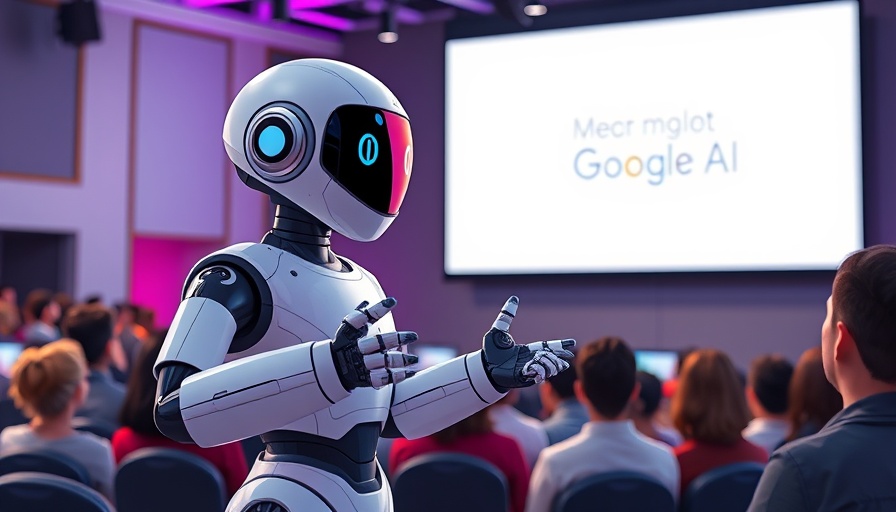
Unpacking Google's Impressive AI Dominance with Gemini
Google's recent announcements at their latest event have ignited a frenzy of excitement in the AI community, showcasing groundbreaking developments poised to redefine communication and technology interaction. At the forefront of these innovations is Google Beam, a cutting-edge video communication platform that harnesses AI to transform traditional 2D video into immersive 3D experiences.
In 'Google Just WON The A.I Race.. (Wow)', the discussion dives into Google's significant AI advancements, exploring key insights that sparked deeper analysis on our end.
The Future of Communication with Google Beam
Imagine a business meeting where participants feel as though they are present with one another. Google's Beam is designed to accomplish just that. This revolutionary platform uses an array of cameras—six to be precise—to capture moments from multiple angles, crafting a realistic 3D visualization. Each video stream is meticulously merged in real-time, allowing participants to engage in conversations just as they would face-to-face, with perfect head-tracking and clarity. As we leap into an era dominated by remote working, products like Beam may well set the stage for communication in the upcoming years, making distance obsolete.
A Bridge Over Troubled Language: Real-Time Speech Translation
The next game-changer comes in the form of Google’s real-time speech translation capabilities integrated into Google Meet. This tool is set to dismantle language barriers, fostering understanding in multilingual scenarios. Through the advanced Gemini model, users will experience seamless communication during meetings and calls, even if participants converse in different languages. By demonstrating practical applications—like booking a vacation rental without a common language—Google is positioning itself as a facilitator of global dialogue. What could this mean for international business and travel? The implications are profound: breaking down barriers could enhance global collaboration and connectivity.
Personalized AI: Project Astra and the Era of Assistance
Entering the realm of personal AI support, Project Astra brings us closer to a universal assistant capable of visual interaction and task completion. Think of an AI that extends beyond simple voice commands; Astra understands its user’s perspective through mobile phone cameras, granting the ability to troubleshoot daily challenges—from mechanical issues to scheduling conflicts. This level of nuanced interaction signifies a step towards a future where AI not only assists but understands, making everyday tasks far more manageable and seamless.
Advancements in Agentic Capabilities
As Google unveils Project Mariner, we are witnessing the dawn of AI agents becoming increasingly integrated into our workflows. Designed to manage multiple tasks simultaneously, this AI agent can assist users in various contexts, ranging from browser navigation to task execution. This push not only showcases Google’s foresight in creating an interconnected ecosystem of AI tools but also underlines the potential for efficiency in professional settings. In a world that demands quick, effective responses, such capabilities could redefine how productivity is approached.
The Power of Contextual Memory
One of the standout features highlighted in Google's announcements is the personal memory capacity within Gemini. By allowing AI to glean context from previous interactions, it aims to offer a tailored experience. By merging past conversations and preferences, Google is setting the stage for interactions that feel personal and intuitive. Imagine receiving replies in your own tone or style; this level of personalization could transform communication environments, both personal and professional. Building rapport with an AI might just become as intuitive as conversing with a friend.
Artificial Intelligence Meets Search: The AIO Views Evolution
With the introduction of AI overviews, Google is making a concerted effort to bring intelligence to search functionalities. The AIO views aim to anticipate user needs, engaging with them beyond mere queries. Google's deep search capabilities allow it to process complex requests, showcasing its potential to revolutionize information retrieval. Users can now enjoy intelligent responses that cater directly to their questions, efficiently collating data across a multitude of sources. This evolution paves the way for an even more personalized and engaged user interface, altering how individuals access information.
The Future of Creative Expression through AI
To cap it all off, Google's advancements in generative models such as Imagine 4 are pushing the boundaries of creativity in artistry and design. The ability for AI to produce stunning visuals and rich content will empower creators, affording them opportunities to explore innovative avenues in filmmaking, app design, and beyond. As AI becomes more artistically expressive, we are likely to witness a significant paradigm shift in content creation—merging human creativity with machine precision.
Conclusion: The Road Ahead
In examining the transformative nature of Google's advancements in AI, it is clear that these tools hold significant promise for redefining both individual and collective experiences. As we integrate Beam, real-time translations, and personalized assistance into everyday life, we are, in many ways, poised on the brink of a technology-driven renaissance that promises to enhance connectivity, creativity, and communication.
As we explore these developments, it is crucial for individuals and businesses alike to familiarize themselves with these technologies and consider how they might leverage them to enhance their operations and personal experiences. The future is unfolding now.
 Add Row
Add Row  Add
Add 




Write A Comment